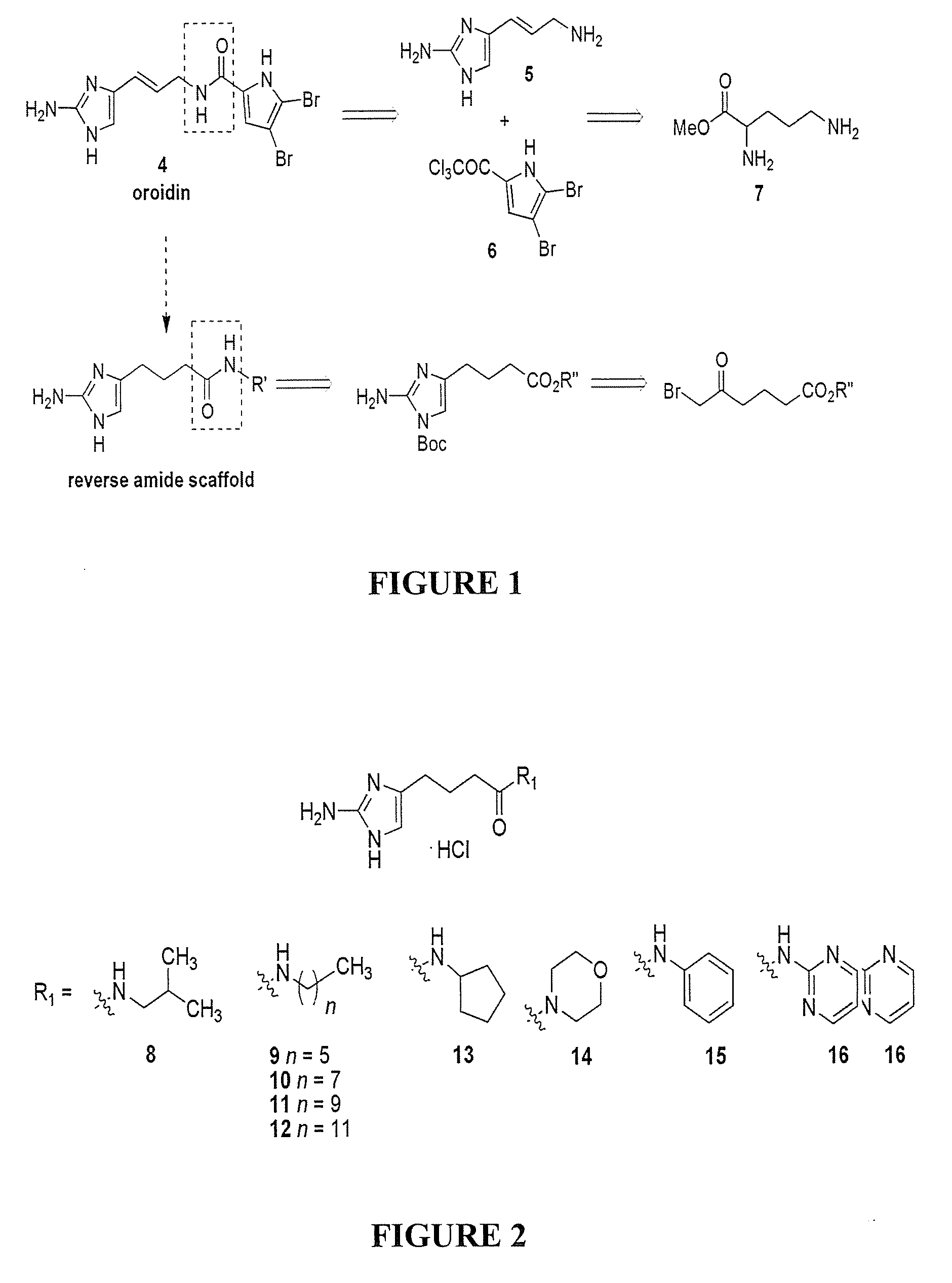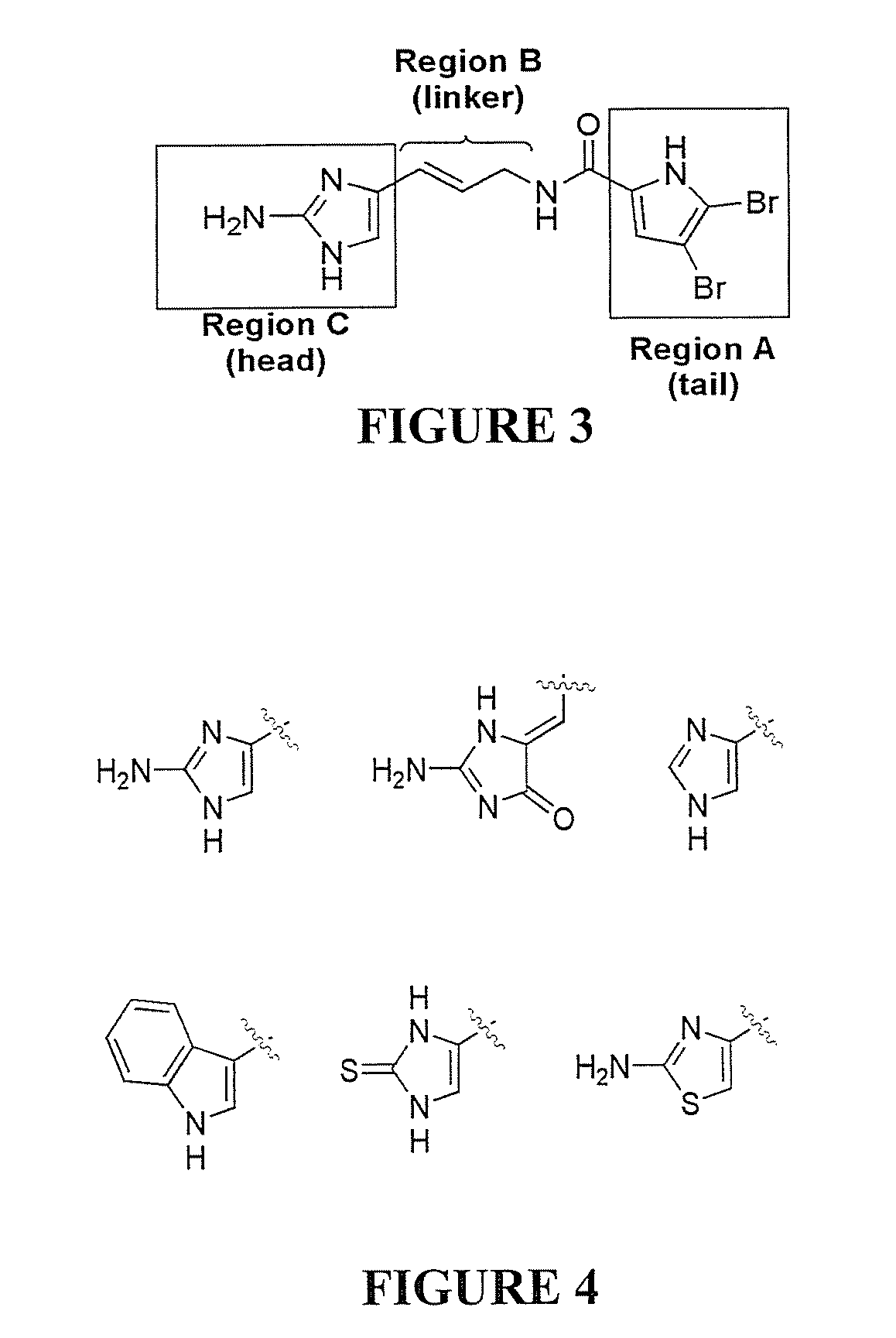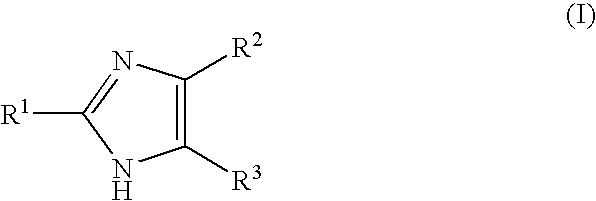Inhibition of biofilms in plants with imidazole derivatives
- Summary
- Abstract
- Description
- Claims
- Application Information
AI Technical Summary
Benefits of technology
Problems solved by technology
Method used
Image
Examples
example 1
[0535]Compound numbering for Example 1 applies only to Example 1. Formula (II)(a)(i) (“compound 1”) was synthesized in 10 linear steps, outlined in Scheme 1. Diethyl fumarate and 1,3-butadiene were subjected to a [4+2]cycloaddition to yield the Diels-Alder adduct 2. The diester 2 was then reduced with lithium aluminum hydride (LiAlH4) to yield diol 3. The diol was then treated with mesityl chloride (MsCl) to generate the corresponding bis-mesylate 4 that was then refluxed with sodium azide (NaN3) to yield di-azide 5. We then epoxidized 5 with meta-chloroperoxybenzoic acid (m-CPBA) at room temperature in the absence of ambient light to generate 6. Epoxide 6 was then treated with NaN3 and sulfuric acid H2SO4 in refluxing ethanol to yield the azidoalcohol 7 that was subsequently subjected to hydrogenating conditions in the presence of Di-tert-butyl dicarbonate (Boc2O). The tri-Boc protected amino alcohol 8 was then oxidized with pyridinium chlorochromate to generate ketone 9. Quantitat...
example 2
Bicyclic 2-aminoimidazole Derivatives
[0537]Compound numbering for Example 2 applies only to Example 2. Three trans-bromoageliferin analogue (TAGE) derivatives were synthesized that possessed an acylpyrrole ring in a manner that mimics the ageliferin natural products (Scheme 3).
[0538]Previous studies have indicated that the incorporation of an acyl pyrrole moiety within the 2-aminoimidazole scaffold dramatically increases anti-biofilm activity. To synthesize the three TAGE derivatives, TAGE was first synthesized on multi-gram scale using the synthetic approach we outlined previously. TAGE was then coupled to the appropriate the appropriate acyl pyrrole trichloromethyl ketone to generate the 3 TAGE derivatives (PyrroleTAGE, BromoTAGE, and DibromoTAGE).
[0539]Mammalian cytotoxicity of TAGE was investigated. Bromoageliferin, a natural sponge compound, is known to modulate the activity of calcium channels (U. Bickmeyer, Toxicon, 2005, 45, 627). GH4C1 rat pituitary cells and N2A mouse neur...
example 3
Reverse Amide 2-aminoimidazole Oroidin Analogues
[0545]Compound numbering for Example 3 applies only to Example 3. The marine alkaloid oroidin along with a small library of reverse amide (RA) 2-aminoimidazoles were synthesized. One of the best methods for large scale preparation of the 2-AI scaffold en route to prepare oroidin and other family members involves Akabori reduction (Na / Hg) of ornithine methyl ester 7 followed by condensation with cyanamide under pH controlled conditions (S. Akabori, Ber. Dtsch. Chem. Ges., 1933, 66, 151-158; G. C. Lancini and E. Lazzari, J. Heterocycl. Chem., 1966, 3, 152; A. Olofson et al., J. Org. Chem., 1998, 63, 1248-1253). Oroidin was synthesized as reported and matched characterization data. Derivatization can then be achieved via acylation of the alkyl amine off the carbon tail with variously substituted trichloroacetyl pyrroles. However, this chemistry is plagued by severe limitations, most notably the overall lack of compatibility of this system...
PUM
| Property | Measurement | Unit |
|---|---|---|
| Antimicrobial properties | aaaaa | aaaaa |
Abstract
Description
Claims
Application Information
 Login to View More
Login to View More - R&D
- Intellectual Property
- Life Sciences
- Materials
- Tech Scout
- Unparalleled Data Quality
- Higher Quality Content
- 60% Fewer Hallucinations
Browse by: Latest US Patents, China's latest patents, Technical Efficacy Thesaurus, Application Domain, Technology Topic, Popular Technical Reports.
© 2025 PatSnap. All rights reserved.Legal|Privacy policy|Modern Slavery Act Transparency Statement|Sitemap|About US| Contact US: help@patsnap.com



